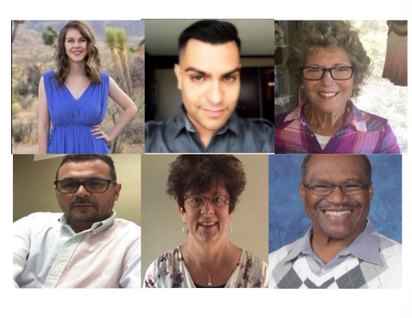Student Health Services Transitions Wellness Resources to Virtual Format
 It's been a fast and furious transition for both students and staff since COVID-19,
while a robust mix of off-campus resources keeps San Bernardino Valley College students
moving toward their academic excellence.
It's been a fast and furious transition for both students and staff since COVID-19,
while a robust mix of off-campus resources keeps San Bernardino Valley College students
moving toward their academic excellence.
From the start of the pandemic, Scott Thayer, Ed.D. Vice President of Student Services,
said campus leaders drilled down on the challenges students were facing to continue
their online studies.
Adjusting academically was a big part of the process. Internet access and Chromebooks
available for checkout was a priority, along with a wide variety of mental health
counseling services.
“When you talk about the mental health challenges, I think a lot of it is that change
is difficult, especially change that hasn't been planned for. This was very abrupt,”
he said.
The campus regularly updates for COVID-19 resources. President Diana Rodriguez has
held weekly and biweekly Zoom meetings for students. The Office of Student Life Zooms
a virtual yoga platform to keep students physically and emotionally agile.
Dr. Thayer said that staff is creative in connecting students to clubs and programs,
even as they are physically distanced from the brick and mortar campus.
Engagement is the key to mitigating isolation, he added.
“We're dealing with a lot of stressors. That's the part we want to help to address,”
he said. “Unemployment is another major hit. Many students fall into the essential
worker category with a high risk of exposure, while many others have lost jobs in
the economic downturn.”
Whether professionally, personally, emotionally, or academically, he sees how Valley
College students and staff are rising to the challenge to get successfully through
their education.
“With everything that they're dealing with, the ability to maintain enrollment and
continue their education -- it's just a great testament to their resiliency,” he said.
Many students are not only swinging their own study schedules while being at home,
but also acting as teachers to their own children. Before Coronavirus, they could
visit the library to find some quiet time to focus on their education.
Now at home, the process of learning is taking on a new dynamic.
Dr. Elaine Akers said she is concerned that job loss, along with being confined in
tight spaces, also magnifies stress and family conflicts.
“They're adjusting to a virtual environment for college, and the normal challenge
of putting food on the table, and a roof over their head," said Dr. Akers, coordinator
(Faculty) Student Health Services.
SBVC offers an array of support services for parents with children at home. Through
her department, students receive a whole host of online resources for health and mental
health support. Virtual counseling is available, some operate after-hours with a 24/7
text number, which she said is popular.
They can confidentially text to connect with a trained mental health worker.
“A lot of students like to use this crisis text because you can be in a group and
nobody knows what you're saying," she said. "In a crowded environment, it's hard to
find the privacy to even talk to someone on the phone."
Counseling services are available to students via HIPAA Compliant Zoom applications.
They can also access many apps online, crisis and mental health services to help them
stay calm and carry on.
The campus also provides access to the food pantry so no one has to go hungry.
“From a more general standpoint, all of us are struggling, but some of our students
are struggling more,” Dr. Akers said.
In moving through these hard times, she recommends students try one new thing each
day when it comes to exercise, nutrition and rest.
"Students need to know they're not alone in experiencing stress and mental health
issues they never had before, the loneliness and isolation, and they need to reach
out for help,” she said. “Don't suffer in isolation.”
For more information, see Student Health Services.

